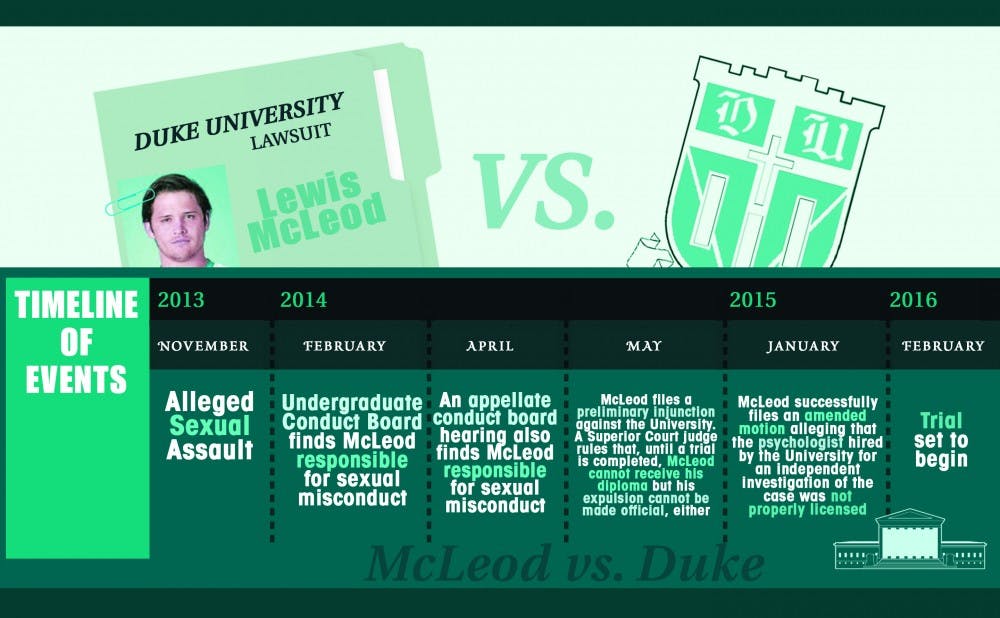Approximately a year after Lewis McLeod was first found responsible for sexual misconduct by an undergraduate conduct board hearing, a date has been set for his trial against the University—and his time in court will be another year away.
McLeod, who entered Duke with the Class of 2014, was expelled after he was found responsible for sexual misconduct in both an initial hearing and an appellate hearing. He filed a preliminary injunction against the University in May 2014 and is now suing Duke for his diploma, claiming that his case was handled unfairly by the University. Though the trial was previously scheduled to start this month, McLeod filed an amended version of his case in December 2014, which was approved in January. Now, the trial is set to begin Feb. 1, 2016—nearly two years after his first undergraduate conduct board hearing.
The University cannot comment on pending litigation, said Michael Schoenfeld, vice president for government relations and public affairs.
In the amended version of his case, McLeod adds three defendants. In addition to suing the University, he is now suing Sue Wasiolek, assistant vice president for student affairs and dean of students; Stephen Bryan, associate dean of students and director of the Office of Student Conduct; and Celia Irvine, a psychologist Duke hired to conduct an independent investigation of McLeod's case for the student conduct hearing.
Much of the amended complaint focuses on Duke's decision to hire Irvine—who, according to the filing, was "incompetent, capricious and lacked fundamental fairness."
According to the complaint, Irvine's job was to investigate the identity and conduct of McLeod and to secure evidence to be used by an investigative committee.
The complaint notes that Irvine's psychology license does not permit her to conduct such investigations in North Carolina. According to Irvine's personal website, she is licensed in New York, but no other states.
The University knew that Irvine was not licensed when she was hired, according to the complaint.
"It kind of begs the question of why Duke hired her," said Rachel Hitch, who serves as McLeod's lawyer.
Wasiolek was responsible for interviewing and retaining Irvine, according to the complaint.
In addition to working without proper licensing, Irvine "devoted relatively little time or energy" to the investigation—reporting a "significant amount of inconsistent or wrong information" and failing to collect "critical information essential to an adequate or even minimally competent investigation into the allegations."
The complaint notes that Irvine did not interview several witnesses it considers who McLeod considered crucial to the case and did not use proper procedures for interviewing the witnesses she did speak with. Irvine did not record any of her interviews and did not address inconsistencies that appeared in the interviews.
McLeod's case began in November 2013, when he met a female freshman student at Shooters II Saloon. The two returned to McLeod's off-campus house, where they engaged in sexual intercourse. The female student alleges the sex was not consensual, reporting that she began crying at one point and made it clear she did not wish to continue. She reported the incident, and the Durham Police Department contacted McLeod the next day informing him that the student claimed he had raped her.
McLeod was not charged with a crime following a brief investigation that was closed due to the female student's "lack of cooperation" with DPD. The case was then pursued through Duke's disciplinary system.
A February undergraduate hearing found McLeod responsible for sexual misconduct—a term which encompasses sex- or gender-based harassment, sexual violence, sexual exploitation, relationship violence and stalking. He appealed the finding, and an April appellate hearing found him similarly responsible, with a disciplinary sanction of expulsion. McLeod, however, was still allowed to take his final exams.
Prior to his expulsion, McLeod was set to graduate with his Class in 2014.
In Summer 2013, Duke changed its policies to include expulsion as the recommended sanction for sexual assault. According to statistics released by the Office of Student Conduct, one student was expelled for a disciplinary violation in the 2013-14 academic year.
"Duke was looking to expel the first kid under that new practice to show how tough they were on sexual assault," Hitch said. "Fairness to Mr. McLeod was not a priority."
Get The Chronicle straight to your inbox
Signup for our weekly newsletter. Cancel at any time.

